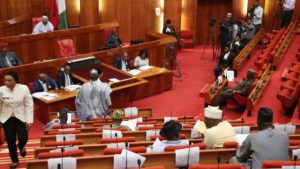By Omidiji Olamilekan Qayum
The Nigerian federal legislative arm currently operates on two chambers- the upper chamber, which comprises senators and the lower chamber, regarded as the House of Representatives. The upper chamber comprises 109 senators where each senator earns N700,000 as basic salary and N13.5m as running cost, totalling N14.2m.
The House of Representatives currently has 360 seats, with each member earning a basic salary of N606,000 and a running cost of N8.5m, totalling N9.1m. Cumulatively, members of the upper chamber earn a total of N1.5bn monthly. Members of the lower chamber earn 3.3bn monthly, which implies a monthly payment of 4.8bn to the legislative arm from the taxpayers’ money. More so, presiding and principal officers earn higher, and the lawmakers also enjoy other welfare packages.
Despite these huge funds, the provisions of the 1999 Constitution is set to be altered as a new bill seeking to create 111 additional exclusive seats for women in the National Assembly has passed second reading. Each of the nation’s 36 states has three Senatorial seats, including a representative of the Federal Capital Territory, while House of representatives membership is based on each state population size.
If passed into law, two additional seats will be created in the lower chamber for each state as well as the FCT, making an additional 74 seats, bringing the total to 434, while the bill would also create 37 additional seats in the Senate, one from each state, including the FCT.

The bill was sponsored by the Deputy Chief Whip, Hon. Nkiruka Onyejiocha who argued that the bill would remedy the low representation of women in the legislative arm by providing additional exclusive seats for only women in the National Assembly and State Houses of Assembly as a temporary measure to promote women’s representation.
According to the lawmaker, the Bill also “provides that one additional member from each of the three senatorial districts in the state will be created exclusively for women in each House of Assembly”. The Bill is also subjected to a review after four general election cycles of 16 years to retain, increase or abolish the temporary measure, she said.
Of the 360 seats in the House of Representatives and 109 Senate seats, only about 18 seats are presently occupied by women in the National Assembly. As such, If passed into law, the bill would bring the Senate to a total of 146 seats and the House of Reps to a total of 434 seats with increased female lawmakers accordingly.
While experts have advocated for a unicameral legislative system in Nigeria to help cut the cost of governance due to the dwindling revenue and worsening economic indices, the Nigerian taxpayers will spend an average of N1.2bn monthly on maintaining the new 111 lawmakers if the Bill scales through.
If the 9th national assembly maintains the current welfare package for lawmakers, an additional 37 senators will earn N532.8m monthly. At the same time, the other 74 representatives would get N673.4m per month, making an additional N1.2bn to the previous monthly N4.8bn, which totals about N6bn monthly for lawmakers welfare, should the Bill be passed into law.